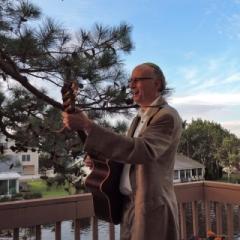
Volunteer of the Month: Robbie Solomon
Robbie was certified in 1990. He is cantor at Baltimore Hebrew Congregation in Baltimore, Maryland.
In what capacity have you volunteered for the ACC? Did someone approach you, or did you volunteer on your own?
I was on the board for one term (2-3 years), but before that I was on several key committees. I worked on the committee looking at the copyright situation regarding music for cantors. We worked toward getting a system for us to comply with the copyright laws. It’s still in the works. It takes a tremendous infrastructure to work on that. It might benefit us now that we’ve purchased and will manage Transcontinental Music. The fact that I was a composer and was knowledgeable about some of the issues made people approach me on this. Also, I was involved in the last convention in Israel. Jonathan Comisar and I ran some of the concerts in Israel and they were very successful. I hope to be more active in my retirement in a couple of years, especially with the Transcontinental industry. We’ll see what happens with that.
What’s the best part of being a Cantor?
I like the great flexibility in the Reform movement where you can do a lot of different kinds of music. I love that part. The other fact is that you’re helping people. You’re able to affect peoples’ lives in a positive way either through music or pastoral work, or teaching. That’s very rewarding. One of the other great things about being a cantor is how varied the work is. It’s not a routine kind of activity. Every day is different. You don’t get bored. The downside is that we work weekends. It’s a clergy complaint, that you don’t have a normal social life. But the benefits far outweigh the deficiencies.
In your opinion what’s the biggest challenge facing the cantorate today and in the future?
The lack of participation by the millennials in organized religion. It’s a hard sell. It’s hard for them to accept the previous assumption by people of our generation and older, that you’d naturally belong to a synagogue. It was an automatic thing. Now you have to work to persuade young people to do so.
What influenced you to become a Cantor?
When I was a young boy I had a good voice. In Hebrew school I sang with a friend. We sang duets. At age 10 we both landed jobs as High Holiday boy soloists in an Orthodox shuls in Baltimore as part of all male choirs who stood around the cantor at the amud. We kept those jobs until our voices changed around Bar Mitzvah age. So I really started cantorial work at age 10. However, I didn’t think I wanted to be a cantor back then because the cantor at my synagogue was very egotistical. He didn’t like people singing with him. He was a terrible role model. In the early days people would say that my voice sounded like a cantor and I’d go “Thanks, a lot.” I didn’t want to associate myself with the type of cantor like I had in my shul. But I got into folk and pop music early; I learned to play many different instruments. After college I went to rabbinical school, and when I lived in Israel I just started studying music composition seriously and decided that would be my life. It was that mix, religion and music, that led me inevitably back to the Cantorate.
Tell us something about yourself that we may not know, but would like to share.
I’ve been in a lot of different kinds of musical groups. In high school I was in a jug band, called Uncle Jack’s Rompin’ Stompers. We’ve all stayed in touch over the years; in fact, we have an anniversary coming up. Last year we did a reunion on Cape Cod, Massachusetts. We busked on the streets of Provincetown. It was really fun. It was during the big parade there. This year we’re coming back to Baltimore where we all grew up and get together again. One of the early songs I recorded with Safam, “V’ne-emar”, was influenced by the jug band. It had a barbershop quartet mixed with a jug band feel to it. I played jug and mandolin on that track.

